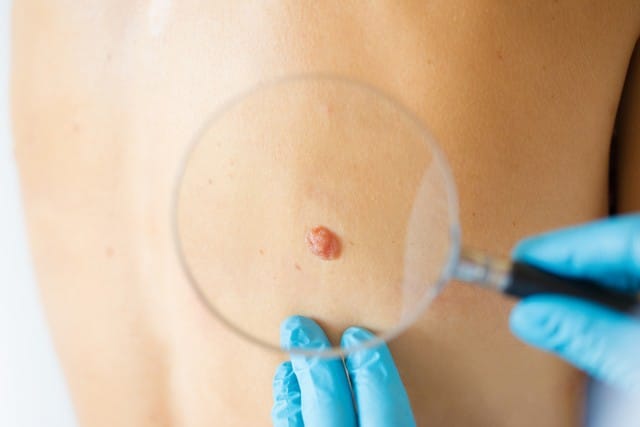Skin cancer is one of the few cancers that are not only highly visible, but can be cured if caught in the earliest stages. This is why routine skin cancer screenings with a diagnosis are vital to ensuring effective treatment. The deadliest type of skin cancer, called melanoma, has a survival rate of 99% after five years of diagnosis. However, this is only if the tumor is spotted in the earliest stage on the skin. Spreading cancer drops the survival rate after five years to 15%, which makes the perfect case for ongoing evaluations and screenings.
What are signs that a mole might be more than just a mole?
The top three signs that a mole might be an indication of skin cancer include:
- Changes in appearance. Any changes that occur to an otherwise “normal” mole might be reason for concern. Changes may occur in the shape, size, color, or symmetry of the mole. These fluctuations in a mole’s appearance may be reason for concern and often require an evaluation and biopsy with a medical professional.
- Bleeding. A mole that has been on the body that starts to bleed indicates there may be a concern. Bleeding moles that seem to occur for no reason, such as trauma or injury to the area, should be evaluated by a medical professional to determine if cancerous cells are present.
- Sores that don’t heal. While moles are a common way to spot cancer, there are other skin growths that may raise concern. If you have a sore or wound that doesn’t seem to heal or continues to bleed or puss, an evaluation may be needed to determine if this area is cancerous.
Are you worried about the changes that have occurred to an existing mole on your skin?
It is critical that patients who notice changes to moles connect with a dermatological professional to undergo a skin cancer screening. This evaluation can be done right in our office with one of our trained doctors to ensure problems such as cancer are caught in the earliest of stages for successful intervention. Call Hollywood Dermatology and Cosmetic Specialists in South Florida at (954) 961-1200 to request a screening and book an appointment to be evaluated.






